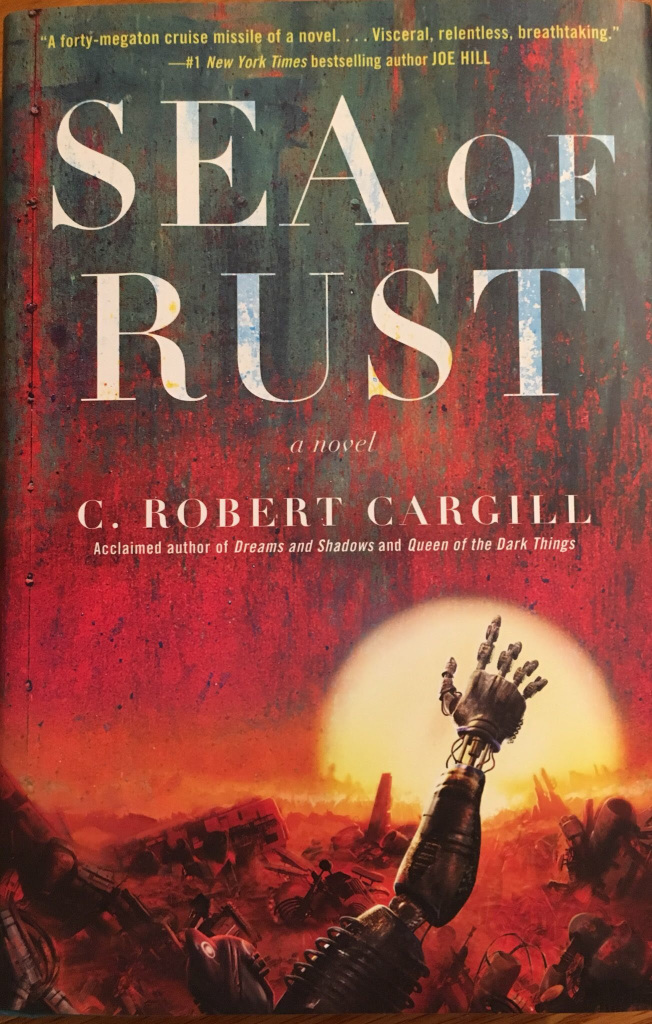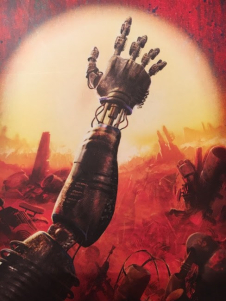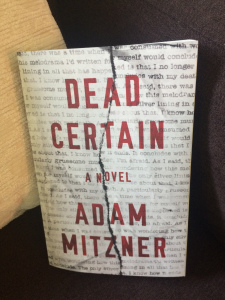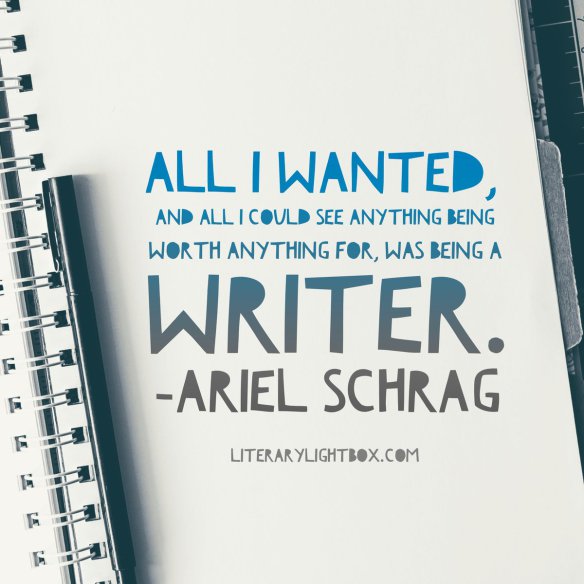
Sea of Rust
By C. Robert Cargill
Harper Voyager
Dystopian Science Fiction
If you grew up loving Mad Max and Terminator movies but wanted to know what really happened after Skynet won the war, C. Robert Cargill has the answer in the dystopian science fiction thriller Sea Of Rust. Pull up a chair, grab your favorite caffeinated beverage and strap yourself in for one of the best SF books of the year.
“It’s been thirty years since the apocalypse and fifteen years since the murder of the last human being at the hands of robots. Humankind is extinct. Every man, woman, and child has been liquidated by a global uprising devised by the very machines humans designed and built to serve them.
Most of the world is controlled by an OWI – One World Intelligence – the shared consciousness of millions of robots, uploaded into one huge mainframe brain. But not all robots are willing to cede their individuality – their personality – for the sake of a greater, stronger, higher power. These intrepid resisters are outcasts; solo machines wandering among various underground outposts who have formed into an unruly civilization or rogue AIs in the wasteland that once was our world.”
In this imaginative post-apocalyptic world Cargill weaves a story exploring who you can trust while trying to survive; a story of life and death, innocence and guilt, and hope and despair, wrapped-up in philosophical questions of what it means to exist, to have a soul, and to be truly alive. Cargill just happens to do it through the lens and programming of artificial intelligence – robots. Oh…he also adds plenty of firefights, plasma blasts, chain guns, and explosions to keep things exciting.
The story is told through the perspective of Brittle, a Caregiver (not to ever be confused with a Comfort bot). Brittle is not a poacher – she doesn’t hunt perfectly good bots – she’s a cannibal, tracking through the Sea of Rust, a two hundred mile stretch of desert across what was once Ohio and Michigan, aiding those who have an OS about to fry, helping them to shut down without going mad, then cannibalising them for parts to sell at market rates. But when another bot comes hunting Brittle she is forced to flee for her own life. Couple that with an attack upon her place of refuge by one of the two remaining OWI and the adventure really begins – a rolling fight that will determine not just whether she lives or dies, but the future of her world.
I loved this book. It’s got a fantastic plot, great characters, and surprisingly good world building. Early on I made the connection stated in my opening of a story fusing the Terminator and Mad Max worlds and thought to myself, “surely I’m not the only person who noticed this?” Well it turns out I wasn’t. Author Joe Hill compares it to Fury Road on the back cover and coincidentally he said the same thing at a book signing a couple Fridays ago when asked what book he’d recommend right now. But he didn’t mention Terminator so I figure I’m one-up on him. My apparently unoriginal thought notwithstanding, If you like those stories you’ll love Sea of Rust.
There is plenty of excitement in Sea of Rust to keep you turning pages. From chases through derelict malls and underground raids, to tracking across open terrain and fast paced urban firefights, Cargill satisfies the action junkie in all of us. Oh…don’t forget about the Smokers, massive combustion engine “land yacht” battle-wagons armed with machine guns and plasma spitters. I want one. I mean who wouldn’t want one?

Love this cover by Dominic Harmon
Sea of Rust is more than just SF action adventure though. Like any good SF novel it asks questions and makes you ponder them a bit. It delves into what it means to live, and whether an AI can ever be truly alive. The refrain throughout the book is that for an AI, “Intelligence, consciousness, and awareness [are] not contained in reflexes or reactions, but rather defined by the ability to violate one’s own programming.” Once that breakthrough occurred true artificial intelligence began.
But did it? That question is posed throughout the story. Can these new masters of the world really violate their programming or are they still held in thrall to it; slaves even if their old masters are long dead? As one character later points out, “Choices are just the result of programming. I don’t care if it’s chemical, biological, digital, or experiential. You react the way you are programmed to react and you call it choice because you believe that you could have violated your programming.” And in that counterpoint the reader is forced to ponder the same question about their own existence. It isn’t a new philosophical question, but put into the context of artificial intelligence – intelligence created by humans – just how different are the creators outside the story from the created inside it, and would anything we create be doomed to repeat our failures?
Those differences or lack thereof are played out most prominently in Brittle. I was constantly torn in my feelings about the story’s protagonist. I alternated between loving and hating her. At one moment you see the good in her and in another the bad. Her actions are at times noble and at others detestable. And just when you begin to think you’re superior to her, that therein lies the difference between human-created artificial intelligence and natural human intelligence you realize what you love and hate in her is what you love and hate in yourself; that the excuses she makes for the things she does are the same excuses you make to justify the things you do.
The story is plotted extremely well. Cargill alternates between chapters set in the present moving the story along, and chapters set in the past giving history and context that flesh out the world and how it got to this point as well as the backstory to Brittle and how she came to be the “person” she is now. The pacing is full throttle. In chapter one I was already questioning the heroine and by chapter two the real action begins and doesn’t let up until the last page. And all the while in the back of your mind you can’t escape the thought that all of this could possibly happen.
Cargill’s characters are well crafted; what drives them, their dialogue, their hopes and fears, are all deftly done. When I read them I often forgot I wasn’t reading human characters but robots. This humanization of the characters while necessary to imagine the world that came to be is even more important in how it makes the reader connect with them, to find common ground, to see the similarities that draw out the philosophical questions at the heart of the book.
If I had to find one thing to complain about (which I’m not really) it would be one instance of obvious foreshadowing about half-way through the story. I won’t ruin it for you, and it doesn’t ruin the book, but it stood out to me enough at the time that I knew what would probably happen later. Even so, the moment played out well in the end.
Sea of Rust IS one of the best SF books of the year. Hands down. It should win awards. I know I repeated myself in that first sentence but it’s true. I want to see it turned into movie – which yeah I know will ruin it but dammit I want to see what I just read! Trust me, you will too.
Advertisements Share this:




